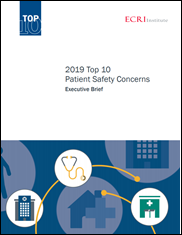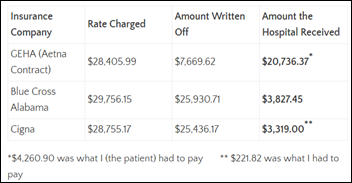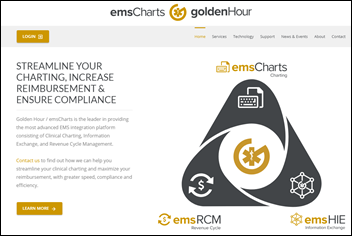News 4/3/19
Top News
Walgreens announces executive changes, store layout redesign, and cost-cutting measures following its announcement of disappointing quarterly results Tuesday.
WBA shares closed down 13 percent Tuesday after the company released results that fell short of expectations for both earnings and revenue. They’re down 12 percent on the year and up just 14 percent over the past five years vs. the Nasdaq’s 96 percent gain.
In yet another example of the “healthcare is big business that takes money from the ill” paradigm, the company’s US pharmacy operations delivered disappointing results because of a mild flu season and a de-emphasis of tobacco.
The company says it has created a new digital leadership team and embedded Microsoft within it.
Reader Comments
From Clarence Oveur: “Re: exhibiting at HIMSS. We’re questioning the value. Wondering if you are hearing that from other companies?” I’ve heard from a couple of folks who asked me what I thought about moving their multi-hundred thousands of dollars of exhibit hall expense into something that might generate actual leads (which for them, HIMSS19 did not, and I’ve heard that quite a bit). Most of those who have toyed with that idea in past years got scared into paying up over fears (likely justified) that competitors would create innuendo around their absence. Consider these points:
- Make sure customers and prospects don’t see an exhibit hall pullout as a sign of financial challenges. Tell them well beforehand why you’ve changed strategies and where you’ll spend the money instead.
- You’ll still probably want a convenient way to connect with people during the conference, which might be an exhibit hall meeting room, a staffed HIMSS Bistro table (if they offer that service again), or either a single event or a series of dinners with an executive. HIMSS locks down basically everything in sight of the convention center and then some, so solve the real estate issue early (a la the JP Morgan Healthcare Conference, which to many attendees is held in unofficial hotels, coffee shops, and park benches because the main venue is sold out).
- Don’t fail to work the hall even if not exhibiting in it. You might find a prospect, partner, employee, acquirer, or acquiree just from wandering around in the right places as a plain old registrant.
- Figure out the kinds of activities that offer better ROI than a glitzy booth. Maybe it’s a series of webinars, regional events, testimonial videos, or sponsorships (OK, that was self-serving) that work all year instead of for just three days.
- Take that tiny part of exhibiting that represents education and make that the focus instead of just watching unengaged passersby offloading swag from your podium.
I’m interested in what readers think about companies who decide to stop exhibiting at the HIMSS conference, so tell me here. Do you care? What other ways can they connect with prospects? I’m especially interest in hearing from companies that have moved their exhibit hall expense into other forms of marketing that turned out to be more effective.
Webinars
None scheduled soon. Previous webinars are on our YouTube channel. Contact Lorre for information.
Acquisitions, Funding, Business, and Stock
NTT Data Services acquires Cognosante Consulting, which provides services to state Medicaid programs. It will operate as NTT Data State Health Consulting.

The Knoxville paper covers PerfectServe’s three 2018 acquisitions, its 220 local employees, and the use of its secure provider communications solution by UT Medical Center.
Sales
- In England, Great North Care Record chooses Cerner for information exchange.
- San Francisco medical group Brown & Toland will implement Epic for ambulatory for its 2,500 independent physicians. The network manages insurance functions for its members and says Epic is the only system that can support both patient care and insurance administration.
Announcements and Implementations
UnitedHealthcare and the American Medical Association will work together to create 20+ ICD-10 codes related to social determinants of health that can be used to trigger referral to social and government services.

KLAS looks a patient privacy monitoring solutions, with Protenus, FairWarning MPS, and Maize Analytics topping the list. Purchasing decisions are often driven by reducing false positive warnings, at which FairWarning MPS was found to excel.

MIT Technology Review notes that DeepMind demonstrated a prototype of its AI-powered retina scanning device in London last week. The 30-second scan can detect retinopathy, glaucoma, and macular degeneration. It’s still years away from availability, however, since the company hasn’t yet submitted it for UK regulatory review.
Meditech expands its Meditech as a Service offering, which was initially offered only to critical access hospitals, to all community health systems.
Government and Politics

The VA joins DirectTrust’s anchor bundle, which will allow its employees to use Direct messaging and information exchange to communicate with 1.8 million providers.
Privacy and Security

“60 Minutes” visits Hancock Regional Hospital (IN) to talk about its January 2018 ransomware attack in which it paid a hacker $55,000 to regain access to its files. The hospital notes that not only was it back in business on the Monday following the Thursday attack, it has since learned that antivirus software that can only recognize a particular technical signature would not have helped (since the strain was new) and it has since added a system that instead looks for patterns of malicious behavior. The hospital also contracted with cybersecurity vendor Pondurance because “if we’re attacked by humans and the only thing we have to defend ourselves is software, then the humans will win.”

An Indian state’s health agency exposes the information of 12.5 million women who had undergone pregnancy-related testing by leaving the Internet-connected database unsecured. The agency didn’t respond to warnings that its information was exposed and the problem was fixed only when India’s Computer Emergency Response Team removed the health information three weeks later. The MongoDB server is still online and exposed, with other agency information still accessible by anyone. The medical data was especially sensitive since it involves data collected to support India’s ban on prenatal sex determination tests, which it implemented to prevent widespread selective abortion of unborn females.
Other

Epic’s April Fools’ Day home page makeover contained some Onion-worthy gems:
- Epic hires CNBC host Jim Cramer as a financial advisor after he urged Apple to buy Epic on “Mad Money.” The funniest part about that bit is Judy Faulkner’s actual response at the time, when she asked a reporter with puzzlement, “Who’s Jim Cramer?” which apparently annoyed him based on his tweets about it afterward.
- The rollout of MyMom, which encourages a health lifestyle with “a dose of love, a firm hand, and perhaps a little guilt.” It will include “genetic test processing filters that predict the likelihood that one day, you’ll have one just like you, and see how you like that.”
- Epic adds a 200-member support team for Fortnite by Epic Games after its reception employees take 400 calls per hour that were intended for the gaming company (that’s apparently a real statistic).

Dear PR people: “discreet” means watching what you say or being modest, which isn’t really an adjective you want to use when referring to data points (that would be “discrete.”)
Kaiser Health News calls out respected hospitals such as Swedish Medical Center, Mayo Clinic, Cleveland Clinic, and University of Miami for offering profitable but medically unproven stem cell-related therapies even as FDA tries to shut down clinics that do the same thing. Some hospitals are even employing informercial-like sales pitches and enthusiastic but anecdotal patient stories to lure cash-paying patients in. One area in which evidence is ample – hospitals and medical practices will do whatever people pay them to, regardless of scientific merit. Just because hospitals are non-profit, unlike medical practices, doesn’t mean they don’t relish bringing in the cash through any legal (and sometimes illegal) means.
Researchers find that Ontario’s experimental payment of bonuses of up to $36,000 for PCPs to keep their patients out of the ED created unintended consequences, with most of the money going to small-town doctors whose patients had fewer PCP visits, less after-hours care, more ED visits, and higher ambulatory costs. The bonus-earning doctors also had lower-acuity patients. The authors identify a problem in creating rewards for those who are already exhibiting the desired behaviors instead of changing those who aren’t, also noting that the payment rules encouraged doctors to send patients to the ED or to specialists instead of to a walk-in clinic.
Pharma bro Martin Shkreli is sent to solitary confinement for using a contraband cell phone to continue running his renamed, price-jacking Turing Pharmaceuticals from his federal prison cell. I’m pretty sure we haven’t heard the last of him since people who are willing to do most anything for money somehow keep finding new ways to take it away from someone else.
Sponsor Updates
- Imprivata will offer its PatientSecure biometric patient ID solution with Verato’s cloud-based MPI as a comprehensive solution to address patient identification and record matching.
- PatientBond will exhibit at the 2019 UCA Urgent Care Convention & Expo April 7-10 in West Palm Beach, FL.
- Meditech publishes a case study on the use of its CAUTI prevention and surveillance tool by RCCH Healthcare Partners.
- AdvancedMD will exhibit at the American Society of Addiction Medicine meeting April 4-7 in Orlando.
- Aprima will exhibit at the CORHIO Forum April 4-5 in Denver.
- PatientPing and Lightbeam Health Solutions will exhibit at the National Association of ACOs spring conference April 24-26 in Baltimore.
- Avaya works with Nuance to develop new self-service automation capabilities with easy-to-navigate conversational interfaces integrated in its Avaya IX Contact Center solutions.
- CompuGroup Medical will exhibit at the AZ HIMSS Annual IT Summit April 11 in Phoenix.
- DocuTap will present and exhibit at the Urgent Care Association Convention & Expo April 7-10 in West Palm Beach, FL.
Blog Posts
- How We Onboard Clients for Lasting IT Security Success (Fortified Health Security)
- How Hospitals Can Improve the Way Providers Interact with Technology (Dimensional Insight)
- ESignature for Informed Consent: It’s a Numbers Game (Access)
- Lessons Learned: What NOT to do When Insourcing VBC RCM (AdvancedMD)
- Map: The highest-paid doctors (and the lowest) (Advisory Board)
- Machine Learning: The Key to Unlocking Healthcare Data (Apixio)
- Vaccines – The Forgotten Miracle (Arcadia)
- How to Best Mitigate Cybersecurity Risks and Protect Your Data (Atlantic.Net)
- Self-Service Experiences Matter Too (Avaya)
- Thriving Under the New ACO Program: How Technology Can Pave the Path to Risk (CarePort)
- Technology to Help Patients and Providers: Key Findings of the ePA and RTBC National Adoption Scorecards (CoverMyMeds)
- How Hospitals Can Use Inventory Management Analytics (Dimensional Insight)
Contacts
Mr. H, Lorre, Jenn, Dr. Jayne.
Get HIStalk updates. Send news or rumors.
Contact us.

















































































































































































Thank you for the mention, Dr. Jayne — we appreciate the callout, the kind words and learning more about the…